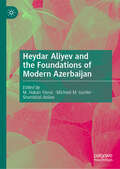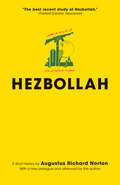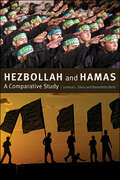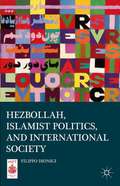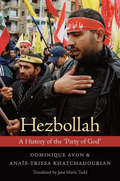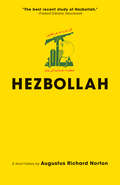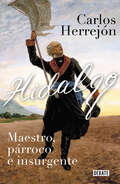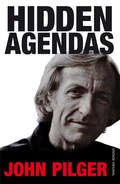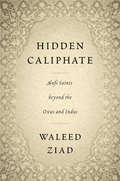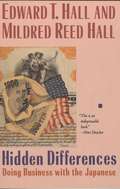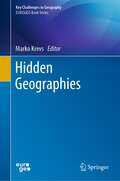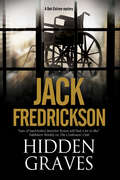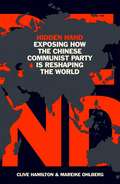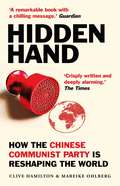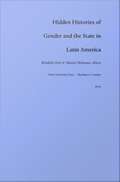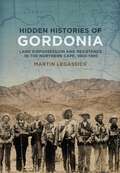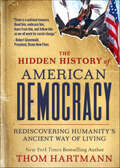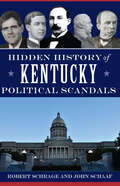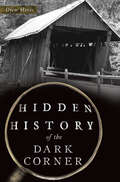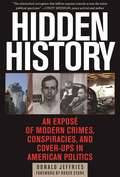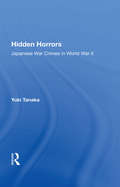- Table View
- List View
Heydar Aliyev and the Foundations of Modern Azerbaijan
by Michael M. Gunter M. Hakan Yavuz Shamkhal AbilovThis edited book examines and analyses Heydar Aliyev, the architect and founder of modern, post-Soviet Azerbaijan. The editors of the volume discuss developments between 1993 and 2003 – a decade that saw the establishment of the institutional foundations of the current republic, the adoption of a new form of national identity, the redefinition of the concept of the Azerbaijani state, and the creation of a security establishment designed to gain control of territories Armenia had held since the 1988-1994 war over Karabakh. The book explains why this fateful period had far-reaching consequences for Azerbaijan as a fully formed state and society, as well as major implications for its political future and its geopolitical strategy.
Hezbollah
by Augustus Richard NortonMost policymakers in the United States and Israel have it wrong: Hezbollah isn't a simple terrorist organization--nor is it likely to disappear any time soon. Following Israel's war against Hezbollah in the summer of 2006, the Shi'i group--a hybrid of militia, political party, and social services and public works provider--remains very popular in the Middle East. After Lebanon tottered close to disaster, Hezbollah and its allies gained renewed political power in Beirut. The most lucid, informed, and balanced analysis of the group yet written, Hezbollah is essential reading for anyone who wants to understand the Middle East. A new afterword brings readers up to date on Hezbollah's most recent actions.
Hezbollah and Hamas: A Comparative Study
by Benedetta Berti Joshua L. GleisA concise yet comprehensive overview of Hamas and Hezbollah.Hezbollah and Hamas are major players in Middle Eastern politics and have a growing involvement in global events. Despite their strikingly different beginnings, they share a common denominator—an adversary in Israel. Hezbollah and Hamas draws from primary interviews and documents coupled with a thorough review of current scholarship. This is a portrait of the organizations’ roots, histories, ideologies, relationships, tactics, political outlooks, and futures. Joshua L. Gleis and Benedetta Berti present organization charts, maps, and a case study of the TriBorder Area in South America, which frequently serves as an operational center for terrorist groups. Recognizing that these two groups are increasingly relevant to U.S. national security, Gleis and Berti provide a comparative analysis of their histories and political missions that moves beyond reductionist portrayals of the organizations' military operations.
Hezbollah, Islamist Politics, And International Society
by Filippo DionigiHow do the norms of the liberal international order influence the activity of Islamist movements? This book assesses the extent to which Islamist groups, which have traditionally attempted to shield their communities from 'external' moral conceptions, have been influenced by the principles that regulate international society. Through an analysis of Lebanon's Hezbollah, Filippo Dionigi concludes that international norms are significant factors changing Islamist politics. We are still far from an accomplished resolve of the tension between Islamist communitarianism and liberal normative views, but a precarious equilibrium may emerge whereby Islamists are persuaded to rethink the idea of an allegedly 'authentic' Islamic morality as opposed to the legitimacy of international norms.
Hezbollah: A History of the "Party of God"
by Dominique Avon Anais-Trissa KhatchadourianFor thirty years, Hezbollah has played a pivotal role in Lebanese and global politics. That visibility has invited Hezbollah’s lionization and vilification by outside observers, and at the same time has prevented a clear-eyed view of Hezbollah’s place in the history of the Middle East and its future course of action. Dominique Avon and Anaïs-Trissa Khatchadourian provide here a nonpartisan account which offers insights into Hezbollah that Western media have missed or misunderstood. Now part of the Lebanese government, Hezbollah nevertheless remains in tension with both the transnational Shiite community and a religiously diverse Lebanon. Calling for an Islamic regime would risk losing critical allies at home, but at the same time Hezbollah’s leaders cannot say that a liberal regime is the solution for the future. Consequently, they use the ambiguous expression “civil but believer state. ” What happens when an organization founded as a voice of “revolution” and then “resistance” occupies a position of power, yet witnesses the collapse of its close ally, Syria? How will Hezbollah’s voice evolve as the party struggles to reconcile its regional obligations with its religious beliefs? The authors’ analyses of these key questions-buttressed by their clear English translations of foundational documents, including Hezbollah’s open letter of 1985 and its 2009 charter, and an in-depth glossary of key theological and political terms used by the party’s leaders-make Hezbollah an invaluable resource for all readers interested in the future of this volatile force.
Hezbollah: A Short History | Updated and Expanded Third Edition (Princeton Studies in Muslim Politics #69)
by Augustus Richard NortonWith Hezbollah's entry into the Lebanese government in 2009 and forceful intervention in the Syrian civil war, the potent Shi‘i political and military organization continues to play an enormous role in the Middle East. A hybrid of militia, political party, and social services and public works provider, the group is the most powerful player in Lebanon. Policymakers in the United States and Israel usually denounce Hezbollah as a dangerous terrorist organization and refuse to engage with it, yet even its adversaries need to contend with its durability and resilient popular support. Augustus Richard Norton’s incisive account stands as the most lucid, informed, and balanced analysis of Hezbollah yet written--and this fully revised and updated edition features a new prologue and conclusion, as well as two new chapters largely devoted to the group’s recent activities, including its involvement in Syria. Hezbollah is a work of perennial importance and remains essential reading for anyone who wants to understand the Middle East.
Hezbollah: The Story of the Party of God
by Eitan AzaniAn exploration of the Hezbollah movement from a multidisciplinary, comprehensive, historical, and systematic perspective, this book explains how it has evolved since its inception in the early 1980s to the present. The author argues that the Hezbollah movement is a product of the environment in which it operates and of the interactions as well as of the reciprocal relations between the players surrounding it. The 2008 model of Hezbollah is one of a pragmatic terrorist organization that is far more dangerous than that of the revolutionary Hezbollah of the eighties. In fact, the movement hasn't abandoned its goals, but changed their pace of application. "
Hi Hitler!
by Gavriel D. RosenfeldThe Third Reich's legacy is in flux. For much of the post-war period, the Nazi era has been viewed moralistically as an exceptional period of history intrinsically different from all others. Since the turn of the millennium, however, this view has been challenged by a powerful wave of normalization. Gavriel D. Rosenfeld charts this important international trend by examining the shifting representation of the Nazi past in contemporary western intellectual and cultural life. Focusing on works of historical scholarship, popular novels, counterfactual histories, feature films, and Internet websites, he identifies notable changes in the depiction of the Second World War, the Holocaust, and the figure of Adolf Hitler himself. By exploring the origins of these works and assessing the controversies they have sparked in the United States and Europe, Hi Hitler! offers a fascinating and timely analysis of the shifting status of the Nazi past in western memory.
Hidalgo: Maestro, párroco e insurgente
by Carlos HerrejónDe joven prodigio a desastre militar. De bon vivant a encadenado. De rector a seductor de masas. De párroco celoso a excomulgado. Y —ahora, 200 años después— de héroe mítico a hombre de carne y hueso. Al señor Miguel Gregorio Antonio Ignacio Hidalgo y Costilla Gallaga Mandarte y Villaseñor le bastaron seis meses para convertirse en el mayor héroe de la historia nacional: fue capturado tan sólo medio año después de haber dado el Grito de Dolores. Desde su fusilamiento, su leyenda no ha hecho más que aumentar. Pero los «altares civiles» y los monumentos han ocultado toda la complejidad de un ser humano fascinante. ¿Qué pasó durante los 57 años que antecedieron al Grito? ¿Cómo fue que el joven violinista y luego cura alfarero llegó a liderar un ejército de 80 mil hombres? ¿Cómo pasó de hablar otomí, francés, latín y español a balbucear el lenguaje de la revolución? ¿Por qué su mayor aliado -Allende- quiso matarlo? ¿Cómo fueron los dos juicios que lo llevaron a la degradación y al fusilamiento? En esta magna obra ilustrada, el doctor Carlos Herrejón -tal vez el mayor especialista en Hidalgo- nos presenta la biografía más acuciosa que se haya hecho del guanajuatense. Mientras pinta cómo era la vida en la Nueva España, disecciona los años de formación y los de esplendor académico y clerical de Hidalgo, igual que los meses de guerra y prisión. Nos muestra, en fin, que el Padre de la Patria es un gran desconocido para sus hijos. miguel hidalgo y costilla;josemaria morelos y pavon;mexico;independencia; nueva españa; corralejo; penjamo;insurgentes, insurgencia;historiade mexico; historia; historia mexicana; hidalgo;allende;miguel allende; Abasolo;la corregidora; josefa ortiz de dominguez; abad y queipo;grito de dolores; España;virreinato;colonia; colonialismo;estandarte;virgende guadalupe;morelia;Valladolid;guayangareo;vicente guerrero;Iturbide; agustin de iturbide;mina;sentimientos de la nacion;juan o’donoju;guanajuato; michoacan;apatzingan;charo;colegio de san nicolas; umsnh;universidad michoacana de san nicolasde hidalgo;criollo;mestizaje;ejército trigarante;napoleon; napoleon iii;felipe vii; guerra de independencia; alhondiga; alhóndiga de granaditas; cerro de las cruces; Riaño; ignacio lopez rayon [Críticas/Reseñas]
Hidden Agendas
by John PilgerIn this powerful book, journalist and film maker John Pilger strips away the layers of deception, dissembling language and omission that prevent us from understanding how the world really works. From the invisible corners of Tony Blair's Britain to Burma, Vietnam, Australia, South Africa and the illusions of the 'media age', power, he argues, has its own agenda. Unchallenged, it operates to protect its interests with a cynical disregard for people - shaping, and often devastating, millions of lives. By unravelling the hidden histories of contemporary events, Pilger allows us to read between the lines. He also celebrates the eloquent defiance and courage of those who resist oppression and give us hope for the future. Tenaciously researched and written with passion and wit, Hidden Agendas will change the way you see the world.
Hidden Caliphate: Sufi Saints beyond the Oxus and Indus
by Waleed ZiadSufis created the most extensive Muslim revivalist network in Asia before the twentieth century, generating a vibrant Persianate literary, intellectual, and spiritual culture while tying together a politically fractured world. In a pathbreaking work combining social history, religious studies, and anthropology, Waleed Ziad examines the development across Asia of Muslim revivalist networks from the eighteenth to the twentieth centuries. At the center of the story are the Naqshbandi-Mujaddidi Sufis, who inspired major reformist movements and articulated effective social responses to the fracturing of Muslim political power amid European colonialism. In a time of political upheaval, the Mujaddidis fused Persian, Arabic, Turkic, and Indic literary traditions, mystical virtuosity, popular religious practices, and urban scholasticism in a unified yet flexible expression of Islam. The Mujaddidi “Hidden Caliphate,” as it was known, brought cohesion to diverse Muslim communities from Delhi through Peshawar to the steppes of Central Asia. And the legacy of Mujaddidi Sufis continues to shape the Muslim world, as their institutional structures, pedagogies, and critiques have worked their way into leading social movements from Turkey to Indonesia, and among the Muslims of China. By shifting attention away from court politics, colonial actors, and the standard narrative of the “Great Game,” Ziad offers a new vision of Islamic sovereignty. At the same time, he demonstrates the pivotal place of the Afghan Empire in sustaining this vast inter-Asian web of scholastic and economic exchange. Based on extensive fieldwork across Afghanistan, Uzbekistan, and Pakistan at madrasas, Sufi monasteries, private libraries, and archives, Hidden Caliphate reveals the long-term influence of Mujaddidi reform and revival in the eastern Muslim world, bringing together seemingly disparate social, political, and intellectual currents from the Indian Ocean to Siberia.
Hidden Differences: Doing Business With The Japanese
by Edward T. Hall Mildred Reed HallAn analysis and explanation of the unstated rules of Japanese-American business relations. By drawing Western readers into the world in which they must function, the Halls simplify the process of adapting Western ways to a new environment.
Hidden Geographies (Key Challenges in Geography)
by Marko KrevsThis book defines and discusses the term “hidden geographies” in two ways: systematically and by presenting a variety of examples of the research fields and topics concerning hidden geographies, with the aim of stimulating further basic and applied research in this area. While the term is quite rarely used in the scientific literature (more often as a figure of speech than to illustrate or problematize its deeper meaning), we argue that hidden geographies are everywhere and many of them have significant impacts on (other) natural and social phenomena and processes, subsequently triggering changes, for example in landscape, economy, culture, health or quality of life.The introductory section of the book conceptualises hidden geographies and discusses cognitive geography, symbolization of space, and the hidden geographies in mystical literature. Case studies of hidden environmental geographies address soils, air pollution, coastal pollution and the allocation of an astronomical tourism site. Revealing hidden historical and sacred places is illustrated through examples of the visualisation of the subterranean mining landscape, the analysis of the historical road network and trade, border stones and historical spatial boundaries, and the monastic Carthusian space. Hidden urban geographies are discussed in terms of the urban development of an entire city, presenting the role of geography in rescuing architecture, revealing illegal urbanisation, and the quality of habitation in Roma neighbourhoods. Case studies of hidden population geographies shed light on the ageing of rural populations and the impact of spatial-demographic disparities on fertility variations. Discussions of hidden social and economic geographies problematize recent social changes and conflicts in a country, present the implementation of the fourth industrial revolution and borders as hidden obstacles in the organisation of public transport. Hidden geographies are explicitly linked to perceptions and explanations in case studies that address local responses to perceived marginalisation in a city, the solo women travellers’ perceived risk and safety, and hidden geographical contexts of visible post-war landscapes.The book brings such a diversity of views, ideas and examples related to hidden geographies that can serve both to deepen their understanding and their various impacts on our lives and environment, and to attract further cross-disciplinary interest in considering hidden geographies – in research and in our every-day lives.
Hidden Graves: A Pi Mystery Set In Chicago (The Dek Elstrom Mysteries #6)
by Jack Fredrickson&“An investigator with a seductive one-two punch—a delectably smart mouth and a delightfully nimble brain.&” —William Kent Krueger &“Chicago private investigator Dek Elstrom is having a hard time making ends meet, what with the recent collapse of his marriage, the scandal that wrecked his career, and the lack of an actual private investigator&’s license. When a woman hires Dek to confirm the whereabouts of three men, Dek&’s not exactly in a position to turn down the work, despite his client&’s deeply suspicious behavior (Why, for example, does she show up for their meeting wearing an obvious disguise?). When Dek discovers that one of the men is dead and the other two seem to have gone missing, not to mention the fact that the dead man may have taken on a new identity a couple of decades ago, he realizes he&’s stumbled onto the kind of case that could resurrect his career―if he can beat a (trumped-up) murder charge, that is. The writing here is splendid, echoing genre veteran Loren D. Estleman, and Dek Elstrom is the kind of guy we genuinely like spending time with.&” —Booklist
Hidden Hand: Exposing How the Chinese Communist Party is Reshaping the World
by Clive Hamilton Mareike OhlbergThe Chinese Communist Party is determined to reshape the world in its image. The party is not interested in democracy. It sees only a bitter ideological struggle with the West, dividing the world into those who can be won over, and enemies. Many political and business elites have already been lured to their corner; others are weighing up a devil&’s bargain. Through its enormous economic power and covert influence operations, China is now weakening global institutions, aggressively targeting individual corporations, and threatening freedom of expression from the arts to academia. At the same time, Western security services are increasingly worried about incursions into our communications infrastructure. In a landmark study combining meticulous research with unique insights, Hidden Hand exposes the Chinese Communist Party&’s global program of subversion, and the threat it poses to democracy. We have already missed too many warning signs – now it is time to wake up.
Hidden Hand: Exposing How the Chinese Communist Party is Reshaping the World
by Clive Hamilton Mareike OhlbergThe Chinese Communist Party is determined to reshape the world in its image. The party is not interested in democracy. It sees only a bitter ideological struggle with the West, dividing the world into those who can be won over, and enemies. Many political and business elites have already been lured to their corner; others are weighing up a devil&’s bargain. Through its enormous economic power and covert influence operations, China is now weakening global institutions, aggressively targeting individual corporations, and threatening freedom of expression from the arts to academia. At the same time, Western security services are increasingly worried about incursions into our communications infrastructure. In a landmark study combining meticulous research with unique insights, Hidden Hand exposes the Chinese Communist Party&’s global program of subversion, and the threat it poses to democracy. We have already missed too many warning signs – now it is time to wake up.
Hidden Histories of Gender and the State in Latin America
by Elizabeth Dore Maxine MolyneuxThis collection examines the mutually influential interactions of gender and the state in Latin America from the late colonial period to the end of the twentieth century. Locating watershed moments in the processes of gender construction by the organized power of the ruling classes and in the processes by which gender has conditioned state-making, Hidden Histories of Gender and the State in Latin America remedies the lack of such considerations in previous studies of state formation. Along these lines, the book begins with two theoretical chapters by the editors, Elizabeth Dore and Maxine Molyneux. Dore opens by arguing against the prevailing view that the nineteenth century was marked by a gradual emancipation of women, while Molyneux considers how various Latin American state forms--liberal, corporatist, socialist, neoliberal--have more recently sought to incorporate women into their projects of social reform and modernization. These essays are followed by twelve case studies that examine how states have contributed to the normalization of male and female roles and relations. Covering an impressive breadth not only of historical time but also of geographical scope, this volume moves from Brazil to Costa Rica, from Mexico to Chile, traversing many countries in between. Contributors explore such topics as civic ritual in Bolivia, rape in war-torn Colombia, and the legal construction of patriarchy in Argentina. They examine the public regulation of domestic life, feminist lobby groups, class compromise, female slaves, and women in rural households--distinct, salient aspects of the state-gender relationship in specific countries at specific historical junctures. By providing a richly descriptive and theoretically grounded account of the interaction between state and gender politics in Latin America, this volume contributes to an important conversation between feminists interested in the state and political scientists interested in gender. It will be valuable to such disciplines as history, sociology, international comparative studies, and Latin American studies. Contributors. Mara Eugenia Chaves, Elizabeth Dore, Rebecca Earle, Jo Fisher, Laura Gotkowitz, Donna J. Guy, Fiona Macaulay, Maxine Molyneux, Eugenia Rodriguez, Karin Alejandra Rosemblatt, Ann Varley, Mary Kay Vaughan
Hidden Histories of Gordonia: Land dispossession and resistance in the Northern Cape, 1800–1990
by Martin LegassickThe Gordonia region of the Northern Cape province has received relatively little attention from historians. In Hidden Histories of Gordonia: Land dispossession and resistance in the Northern Cape, 1800–1990, Martin Legassick explores aspects of the generally unknown ‘brown’ and ‘black’ history of the region. Emphasising the lives of ordinary people, his writing is also in part an exercise in ‘applied history’ – historical writing with a direct application to people’s lives in the present.Tracing the indigenous history of Gordonia as well as the northward movement of Basters and whites from the western Cape through Bushmanland to the Orange River, the book presents accounts of family histories, episodes of indigenous resistance to colonisation, and studies of the ultimate imposition of racial segregation and land dispossession on the inhabitants of the region. A recurrent theme is the question of identity and how the extreme ethnic fluidity and social mixing apparent in earlier times crystallised in the colonial period into racial identities, until with final conquest came imposed racial classification.
Hidden History
by Donald JeffriesThe US government has spent half the time covering up conspiracies as it has spent helping the American people. In Hidden History, you will see the amount of effort over the past fifty years that our government has dedicated to lying and covering up the truth to the world.Starting with the assassination of President John F. Kennedy, Don Jeffries chronicles a wide variety of issues that have plagued our country's history. Whether it's the assassinations of MLK and RFK, Iran-Contra, the Oklahoma City bombing, TWA Flight 800, voting fraud, or 9/11, every major disaster or war that we've witnessed has somehow been distorted by those who are supposed to be protecting us.Jeffries also delves into extensive research on the death of John F. Kennedy Jr., and you'll be shocked by what he finds out.So whether you've only heard bits and pieces of these stories or have read several books on the topics, Hidden History is the book that belongs in every conspiracy theorist's library, as the information included in this encyclopedia has never been collected together in any other published work available. So sit down, strap in, and get ready to be shocked and awed by how much has been hidden from you by our government over the past fifty years.
Hidden History of American Democracy: Rediscovering Humanity's Ancient Way of Living
by Thom HartmannAmerica's most popular progressive radio host and New York Times bestselling author Thom Hartmann paves the way to saving our democracy. In this powerful, sweeping history and analysis of American democracy, Thom Hartmann shows how democracy is the one form of governance most likely to produce peace and happiness among people. With the violent exception of the Civil War, American democracy resisted the pressure to disintegrate into factionalism for nearly two centuries, and now our very system of democratic elections is at stake. So how do we save our democracy? Hartmann's newest book in the celebrated Hidden History Series offers a clear call to action and a set of solutions with road maps for individuals and communities to follow to create a safer, more just society and a more equitable and prosperous economy.
Hidden History of Kentucky Political Scandals
by Robert Schrage John SchaafeA wild journey through the shady side of Bluegrass politics, from bribe-takers to traitors to treasury raiders. In 1826, Governor Desha pardoned his own son for murder. In a horrific crime, Governor Goebel was assassinated in 1900. James Wilkinson was branded a traitor against Kentucky and the nation. &“Honest Dick Tate&” ran away with massive amounts of money from the state treasury. And in modern times, Operation BOPTROT resulted in perhaps the biggest scandal in the state. At various points in history, Kentucky&’s politics and government have been rocked by scandal, and each episode defined the era in which it happened. In this book, Robert Schrage and John Schaaf offer a fascinating account of Kentucky&’s history and its many unique and scandalous characters. Includes photographs
Hidden History of the Dark Corner (Hidden History)
by Drew HinesThe "Dark" in the Dark Corner Years ago, when travelers to northern Greenville County asked a local where the Dark Corner was, invariably their reply was, "Just a little further up the road." In those days few people wanted to admit they lived in that much storied and much maligned part of the county known as the Dark Corner. The Dark Corner in those days was legendary for its moonshine, murder and mayhem. This is the story of that well-known region. We travel back to the Dark Corner's earliest days when its only human inhabitants were the Cherokee, and we move into the present where horse farms and multi-million-dollar homes dot the countryside that once contained moonshine stills and cornfields.
Hidden History: An Exposé of Modern Crimes, Conspiracies, and Cover-Ups in American Politics
by Roger Stone Donald JeffriesThe US government has spent as much time covering up conspiracies as it has helping the American people. In Hidden History, you will see the amount of effort that our government has dedicated over the past fifty years to lying and covering up the truth to the world.Starting with the assassination of President John F. Kennedy, Don Jeffries chronicles a wide variety of issues that have plagued our country's history. Whether it is the assassinations of MLK and RFK, Iran-Contra, the Oklahoma City bombing, TWA Flight 800, voting fraud, or 9/11, every major disaster or war that we've sitnessed has somehow been distorted by those who are supposed to be protecting us. Jeffries also delves into extensive research on the death of John F. Kennedy, Jr. - and what he finds will shock you.So whether you've only heard bits and pieces of these stories or you've read several books on the topics, Hidden History is the book that belongs in every conspiracy theorist's library, as the information included here has never been collected together in any other published work available. So sit down, strap in, and get ready to be shocked and awed by how much has been hidden by our government over the past fifty years. Updated for 2016, this version features a new introduction by political insider Roger Stone.
Hidden Horrors
by Yuki TanakaThis book documents for the first time previously hidden Japanese atrocities in World War II, including cannibalism; the slaughter and starvation of prisoners of war; the rape, enforced prostitution, and murder of noncombatants; and biological warfare experiments. The author describes how desperate Japanese soldiers consumed the flesh of their own comrades killed in fighting as well as that of Australians, Pakistanis, and Indians. Another chapter traces the fate of 65 shipwrecked Australian nurses and British soldiers who were shot or stabbed to death by Japanese soldiers. Thirty-two other nurses, who landed on another island, were captured and sent to Sumatra to become "comfort women”--prostitutes for Japanese soldiers. Tanaka recounts how thousands of Australian and British POWs died in the infamous Sandakan camp in the Borneo jungle in 1945. Those who survived were forced to endure a tortuous 160-mile march on which anyone who dropped out of line was immediately shot. Only six escapees lived to tell the tale. Based on exhaustive research in previously closed archives, this book represents a landmark analysis of Japanese war crimes. The author explores individual atrocities in their broader social, psychological, and institutional milieu and places Japanese behavior during the war in the broader context of the dehumanization of men at war--without denying individual and national responsibility.
Hidden Horrors: Japanese War Crimes In World War Ii (Asian Voices Ser.)
by Yuki TanakaThis book documents for the first time previously hidden Japanese atrocities in World War II, including cannibalism; the slaughter and starvation of prisoners of war; the rape, enforced prostitution, and murder of noncombatants; and biological warfare experiments. The author describes how desperate Japanese soldiers consumed the flesh of their own comrades killed in fighting as well as that of Australians, Pakistanis, and Indians. Another chapter traces the fate of 65 shipwrecked Australian nurses and British soldiers who were shot or stabbed to death by Japanese soldiers. Thirty-two other nurses, who landed on another island, were captured and sent to Sumatra to become “comfort women‗prostitutes for Japanese soldiers. Tanaka recounts how thousands of Australian and British POWs died in the infamous Sandakan camp in the Borneo jungle in 1945. Those who survived were forced to endure a tortuous 160-mile march on which anyone who dropped out of line was immediately shot. Only six escapees lived to tell the tale. Based on exhaustive research in previously closed archives, this book represents a landmark analysis of Japanese war crimes. The author explores individual atrocities in their broader social, psychological, and institutional milieu and places Japanese behavior during the war in the broader context of the dehumanization of men at war—without denying individual and national responsibility.
